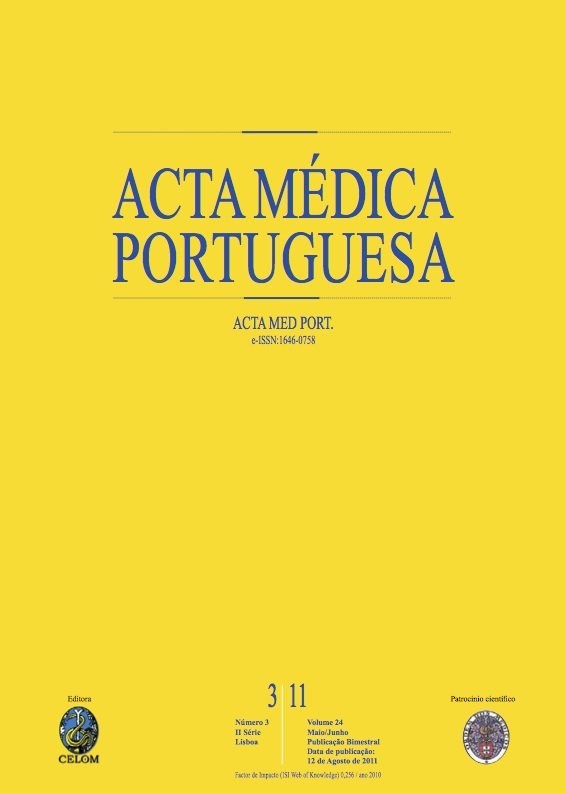Fanconi anemia: cytogenetic diagnosis of 40 cases.
DOI:
https://doi.org/10.20344/amp.465Abstract
Fanconi Anemia (FA) is a rare recessive disorder clinically characterized by progressive bone marrow failure, diverse congenital malformations and increased predisposition to cancer. Given the late onset of anemia, relatively to other cytopenias, and the high variability in the phenotype, a correct clinical diagnosis is difficult, and may be delayed or even missed. This fact may be prejudicial to patients, due to the need of avoiding exposure to toxic agents, programming the transplantation of hematopoietic progenitor cells and screening of neoplasia associated with the disease. Given the high genetic variability (thirteen complementation groups have been identified, each with genes presenting several different mutations), a rapid molecular diagnosis is not possible. However, there is an urgent need for a timely and correct diagnosis, due to the early evolution of the disease towards malignancy and to the early need of finding compatible donors for future hematopoietic stem cell transplantation. Fortunately, the hypersensitivity of FA cells to the clastogenic (chromosome breaking) effect of DNA cross-linking agents, in particular to diepoxybutane (DEB), provides a unique marker for the diagnosis. At present, cytogenetic analysis for detection of DEB-induced chromosome instability is the gold-standard test for the diagnosis of FA. In the present work we present the results from the DEB induced chromosome instability studies performed in the Laboratory of Cytogenetics of ICBAS between 1992 and 2009. Blood samples from 222 patients were obtained from different hospitals mainly from the north and centre of Portugal. This population includes not only patients with clinical suspicion of FA, but also patients presented with thrombocytopenia, pancitopenia or aplastic anemia, for confirmation/exclusion of FA. Two samples of amniotic fluid were also obtained for pre-natal diagnosis. A total of 34 FA patients were diagnosed. Cytogenetic studies were also performed in blood samples from AF relatives, which allowed the diagnosis of 6 new cases, 5 of them corresponding to asymptomatic individuals. In the total population of FA patients studied, 25% belong to the gypsy ethnic group. Periodic cytogenetic studies were also performed in blood samples from AF patients post transplantation, which confirmed the elimination of the original hematopoietic DEB sensitive cells.Downloads
Downloads
How to Cite
Issue
Section
License
All the articles published in the AMP are open access and comply with the requirements of funding agencies or academic institutions. The AMP is governed by the terms of the Creative Commons ‘Attribution – Non-Commercial Use - (CC-BY-NC)’ license, regarding the use by third parties.
It is the author’s responsibility to obtain approval for the reproduction of figures, tables, etc. from other publications.
Upon acceptance of an article for publication, the authors will be asked to complete the ICMJE “Copyright Liability and Copyright Sharing Statement “(http://www.actamedicaportuguesa.com/info/AMP-NormasPublicacao.pdf) and the “Declaration of Potential Conflicts of Interest” (http:// www.icmje.org/conflicts-of-interest). An e-mail will be sent to the corresponding author to acknowledge receipt of the manuscript.
After publication, the authors are authorised to make their articles available in repositories of their institutions of origin, as long as they always mention where they were published and according to the Creative Commons license.









